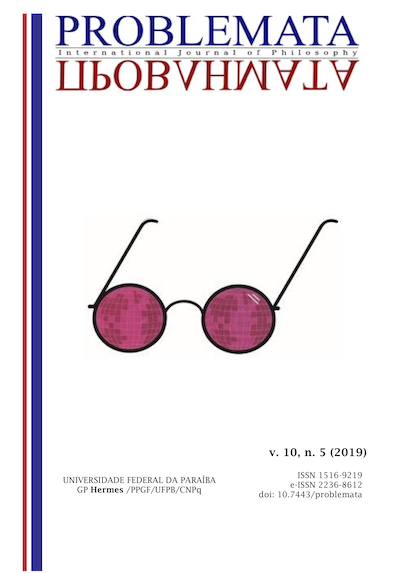THE ETHICS BEHIND HIKIKOMORI RESISTANCE
DOI:
https://doi.org/10.7443/problemata.v10i5.46128Keywords:
Hikikomori, katechon, ethics, freedom, guilt, violence, biopoliticsAbstract
The hikikomori are young people who lock themselves in their room for months or years, refusing to leave it despite the requests of their family and the requirements of their social environment. They stand firm against all these pressures. That is why we could describe his attitude as belonging to a resistant person. However, we would not know in advance if your resistance can merit the qualification of ethics. This is one of the aspects that I try to clarify in this essay.
On the other hand, based on current biopolitics, I analyze how the hikikomori poses with its own existence questions that are certainly disturbing, but it also opens the way to find answers to others that haunt us and we do not know how to approach them.
Downloads
References
Butler, Judith (2009): Dar cuenta de sí mismo. Violencia ética y responsabilidad, Buenos Aires, Amorrortu.
Esposito, Roberto (2005): Inmunitas. Protección y negación de la vida, Buenos Aires, Amorrortu.
Esposito, Roberto (2007): Tercera persona. Política de la vida y filosofía de lo impersonal, Buenos Aires, Amorrortu.
Esposito, Roberto: Stanze.
Flaubert, Gustave (2014): L’ Education sentimentale, Paris, Ilivri.
Moreau, Jacques Louis (1803): Histoire naturelle de la femme, 2 vols. Paris, Duprat-Letellier et comp.
Pascal, Blaise (1897): Pensées et opuscules philosophiques, Paris, Hachette.
Downloads
Published
Issue
Section
License
Authors who publish with this journal agree to the following terms:
- Authors retain copyright and grant the journal right of first publication with the work simultaneously licensed under a Creative Commons Attribution License that allows others to share the work with an acknowledgement of the work's authorship and initial publication in this journal.
- Authors are able to enter into separate, additional contractual arrangements for the non-exclusive distribution of the journal's published version of the work (e.g., post it to an institutional repository or publish it in a book), with an acknowledgement of its initial publication in this journal.
-
- Authors are permitted and encouraged to post their work online (e.g., in institutional repositories or on their website) prior to and during the submission process, as it can lead to productive exchanges, as well as earlier and greater citation of published work (See The Effect of Open Access).





